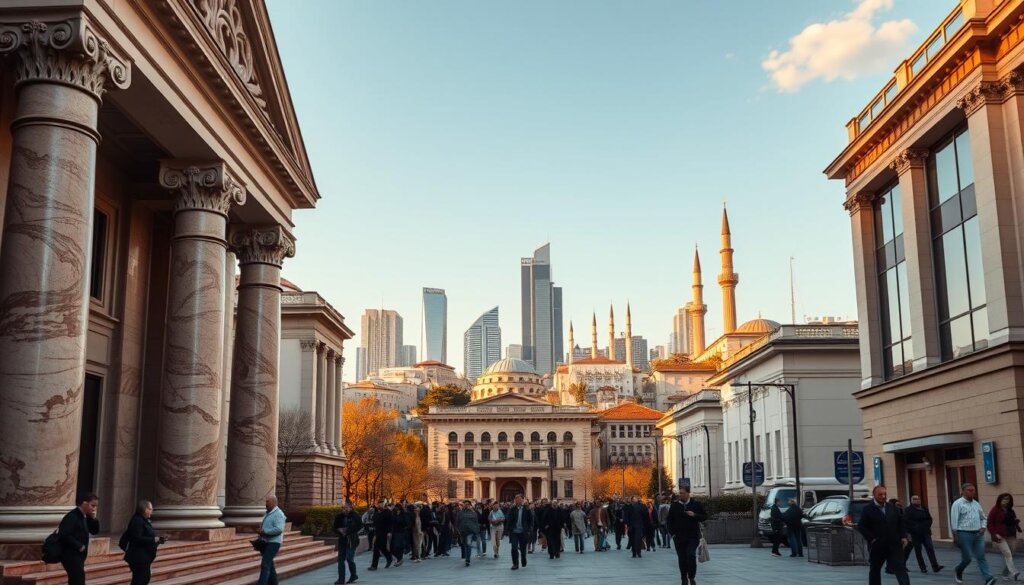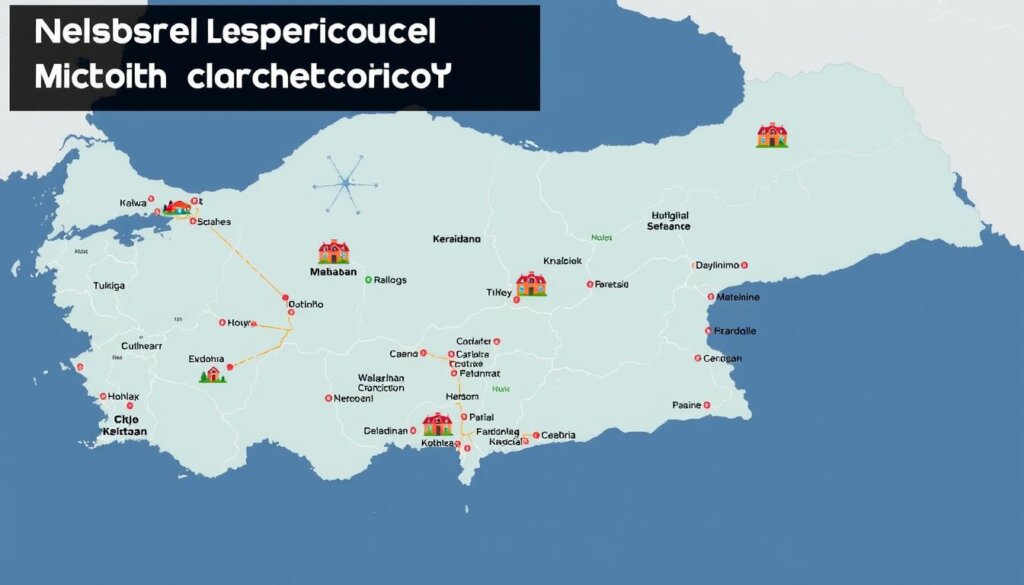As a licensed real estate agent in Turkey since 2006, I’ve helped hundreds of foreign buyers navigate the property purchase process. The first word I always teach them is “TAPU” – the Turkish title deed. Understanding TAPU is crucial for anyone looking to buy property in Turkey, as it’s the foundation of property ownership.
Table Of Content
- Key Takeaways
- Understanding TAPU: The Turkish Title Deed
- What is a TAPU and why is it important?
- Legal significance of TAPU in Turkish property ownership
- What are the new rules for buying property in Turkey
- The 100-day rental rule for short-term properties
- Updated property valuation requirements for residency
- Changes to Turkish citizenship by investment programme
- The Complete Process of Buying Property in Turkey as a Foreigner
- Obtaining a Foreigner Identification Number (YKN)
- Opening a Turkish Bank Account
- Finding the Right Property and Making an Offer
- Legal Checks and Due Diligence
- Legal Requirements and Documentation
- Essential Documents Needed for Property Purchase
- The Role of Notaries in Property Transactions
- Taxes and Costs Associated with Property Purchase
- Purchase Tax and Title Deed Fees
- Notary and Legal Fees
- Annual Property Taxes for Foreign Owners
- Popular Regions for Property Investment in Turkey
- Istanbul: The cultural and economic hub
- Antalya and the Mediterranean coast
- Other emerging investment hotspots
- Turkish Citizenship Through Property Investment
- Current Investment Threshold and Requirements
- Benefits of Turkish Citizenship for Property Owners
- Expert Advice and Conclusion
- FAQ
- What documents are required for a foreigner to buy a property in Turkey?
- How long does it take to complete a property purchase in Turkey?
- Can foreigners obtain Turkish citizenship through property investment?
- What are the annual property taxes for foreign owners in Turkey?
- Are there any restrictions on renting out properties in Turkey?
- Can I purchase a property in Turkey without a Turkish bank account?
- What is the role of a notary in Turkish property transactions?
- How do I obtain a Foreigner Identification Number (YKN) in Turkey?
Turkey continues to attract foreign investors and buyers with its rich history, diverse culture, and strategic location. The Turkish real estate market has seen significant changes, with new rules and regulations impacting foreign buyers and investors. My name is Aydın Çakır, and you can reach me at +90 532 577 87 67 for personalised advice on your property journey in Turkey.
Key Takeaways
- Understanding TAPU is essential for foreign property buyers in Turkey.
- TAPU is the Turkish title deed that proves property ownership.
- The Turkish real estate market has seen significant changes in recent years.
- New rules and regulations impact foreign investors and buyers.
- Turkey offers a straightforward path to residence permits and citizenship.
- Foreign investors can obtain Turkish citizenship through property purchase.
Understanding TAPU: The Turkish Title Deed
As a seasoned real estate agent, I can attest that TAPU is the cornerstone of property ownership in Turkey. Having worked in the industry since 2006, I’ve seen firsthand the importance of understanding TAPU when buying property in Turkey.

What is a TAPU and why is it important?
TAPU, or the Turkish Title Deed, is a legal document that confirms ownership of a property or land. It’s the only legally recognised document that proves you are the rightful owner of a property in Turkey. I always advise my clients to ensure their name is on the TAPU, as it’s the ultimate proof of ownership. The TAPU system provides exceptional security for property owners, as all transactions are recorded in a centralised government database that can be verified at any time.
- The TAPU document includes any restrictions on the property, such as conservation status or military zone limitations.
- Before buying, I recommend conducting a thorough TAPU search at the local Land Registry Office to verify there are no outstanding debts or legal issues.
Legal significance of TAPU in Turkish property ownership
The legal significance of TAPU cannot be overstated. It’s crucial for verifying the property’s legal status, ensuring it’s free of debts or disputes, and that the seller holds the legal right to sell. The Turkish Land Registry system has been digitalised, making the process more efficient and reducing the risk of fraud. When buying land in Turkey, the TAPU will specify exactly what you can and cannot do with the property, including building permissions and zoning regulations.
By understanding TAPU and its significance, buyers can ensure a smooth purchase process and secure their property rights in Turkey.
What are the new rules for buying property in Turkey

The Turkish government has introduced new regulations affecting foreign property ownership, making it essential for investors to stay informed. As a licensed real estate agent in Turkey since 2006, I’ve seen firsthand how these changes impact foreign investors.
The 100-day rental rule for short-term properties
One of the significant changes is the 100-day rental rule, which affects short-term rentals. This rule stipulates that properties used for short-term rentals must be rented out for at least 100 days per year. This change aims to regulate the property market and ensure that properties are used for their intended purpose.
Updated property valuation requirements for residency
The updated property valuation requirements for residence permits have also been introduced. Now, properties must be valued at a minimum of $200,000 to qualify for a residence permit. This change ensures that foreign investors contribute significantly to the Turkish economy.
Changes to Turkish citizenship by investment programme
The Turkish citizenship by investment programme has undergone significant changes. The minimum investment threshold has increased from $250,000 to $400,000. Despite this increase, the programme remains one of the most competitive in the world, offering citizenship to investors and their families. To qualify, the property must be held for at least three years. Upon obtaining Turkish citizenship, investors can enjoy visa-free travel to over 110 countries and potentially obtain a passport.
These changes highlight the evolving nature of Turkey’s property and citizenship laws. As a seasoned expert, I recommend that investors stay informed about these changes to make the most of their investment in Turkey.
The Complete Process of Buying Property in Turkey as a Foreigner
As a licensed real estate agent in Turkey since 2006, I’ve seen firsthand what it takes to successfully buy property here. The process involves several crucial steps, from obtaining the necessary identification numbers to conducting legal checks on the property.
Obtaining a Foreigner Identification Number (YKN)
The first step in buying property in Turkey is obtaining a Foreigner Identification Number (YKN). This unique number is essential for all legal transactions, including property purchases. To get a YKN, you’ll need to visit the local Foreigners’ Department with your passport and other required documents. I always advise my clients to start this process early, as it can take some time to complete.
Opening a Turkish Bank Account
Once you have your YKN, the next step is to open a Turkish bank account. This is necessary for transferring funds for your property purchase and paying ongoing expenses like utility bills. I recommend choosing a bank that offers services in English and has experience with foreign clients. Having a local bank account simplifies the buying process and helps you manage your property more effectively.

Finding the Right Property and Making an Offer
With your YKN and bank account in place, you can start looking for properties. Whether you’re interested in a new development or a resale property, it’s essential to work with a reputable real estate agent who understands the local market. When you find a property you like, I’ll help you make an informed offer, taking into account factors like the property’s condition, location, and market value.
Legal Checks and Due Diligence
Before finalizing the purchase, I arrange comprehensive legal checks and due diligence on the property to protect my clients from potential issues. This process includes verifying the TAPU details, checking for any encumbrances, and ensuring the property complies with local zoning laws. Here’s a summary of the key steps involved in the due diligence process:
| Due Diligence Step | Description | Importance |
|---|---|---|
| Verify TAPU Details | Confirm seller’s ownership and check for encumbrances | High |
| Check Zoning Compliance | Ensure property adheres to local zoning laws | High |
| Inspect Property Condition | Identify potential structural issues or defects | Medium |
| Review Outstanding Fees | Check for unpaid utility bills or property taxes | Medium |
By following these steps and conducting thorough due diligence, you can ensure a smooth process and enjoy your new property in Turkey with confidence. As a buyer, it’s crucial to be aware of the legal requirements and potential pitfalls in the purchase of properties in Turkey.
Legal Requirements and Documentation
Legal documentation plays a vital role in the process of buying property in Turkey. As a licensed real estate agent since 2006, I’ve guided numerous international clients through this process, ensuring they comply with all necessary legal requirements.
Essential Documents Needed for Property Purchase
When purchasing real estate in Turkey, several key documents are required. These include:
- A valid passport
- Foreigner Identification Number (YKN)
- Proof of address
- The sale-purchase agreement
- Documents related to the property’s status, such as the TAPU
Ensuring that all documents are in order is crucial for a smooth transaction.
The Role of Notaries in Property Transactions
Starting in July 2023, notary offices in Turkey gained the authority to conduct official real estate transactions, providing an alternative to the traditional Land Registry Office process. Notaries play a crucial role in verifying the identities of all parties involved and ensuring that all documents are legally valid.

When using a notary for your property transaction, the seller books an appointment through the e-Application system on the Union of Turkish Notaries’ website. The notary office then verifies all information with the Land Registry before confirming the appointment via SMS to both parties.
Taxes and Costs Associated with Property Purchase
As a licensed real estate agent in Turkey since 2006, I always advise my clients to consider the tax aspects of buying property. Understanding these costs is crucial for making an informed decision when investing in Turkish real estate.
Purchase Tax and Title Deed Fees
When purchasing property in Turkey, buyers are required to pay a title deed fee, which is typically around 4% of the property’s value. This fee is split between the buyer and the seller, although the buyer usually covers the majority. Additionally, there may be other costs associated with the transfer of ownership.
Notary and Legal Fees
Notary fees are another expense to consider when buying property in Turkey. These fees cover the cost of verifying the transaction and ensuring that it complies with Turkish law. It’s also advisable to seek legal counsel to navigate the complexities of Turkish property law, which can add to the overall cost.
Annual Property Taxes for Foreign Owners
Foreign property owners in Turkey are subject to annual property tax, known as Emlak Vergisi. The tax rate varies between 0.1% and 0.3% of the property’s tax value, depending on the location and type of property. For instance, apartments are typically taxed at the lower end of this range. Here are some key points to consider:
- The tax value is determined by the local municipality and is often lower than the market value.
- Property tax bills are issued annually and can be paid in two instalments.
- Foreign owners of rental properties are also subject to income tax on their rental earnings.

It’s essential to factor these costs into your budget when considering purchasing property in Turkey. I recommend setting up automatic payments for these taxes to avoid any penalties for late payment.
Popular Regions for Property Investment in Turkey

As a licensed real estate agent in Turkey, I’ve seen a surge in interest in Turkish property investment. The country offers a diverse range of opportunities, from established markets to emerging hotspots.
Istanbul: The cultural and economic hub
Istanbul remains a top choice for property investors, offering a unique blend of culture, history, and economic vitality. The city’s property market is dynamic, with a range of options from modern apartments to historic buildings. Investors can expect strong rental yields and potential for long-term capital appreciation.
Antalya and the Mediterranean coast
Antalya is another popular destination, known for its beautiful landscapes and tourist attractions. The area offers a range of properties, including apartments, villas, and hotels, making it an attractive option for investors seeking rental income.
Other emerging investment hotspots
Beyond Istanbul and Antalya, several other regions are gaining popularity among investors. These include:
- Bodrum Peninsula, known for its luxury developments and vibrant lifestyle.
- Izmir, offering a more relaxed Mediterranean lifestyle with lower property prices compared to Istanbul.
- Ankara, the capital city, providing stable investment opportunities with lower entry prices.
- Fethiye, renowned for its natural beauty and ideal for those seeking a tranquil lifestyle.
These emerging regions offer a mix of lifestyle and investment opportunities, catering to different preferences and budgets.
Turkish Citizenship Through Property Investment

For those looking to expand their global mobility, Turkish citizenship through property investment presents an attractive opportunity. This programme not only allows individuals to acquire a second passport but also offers a range of benefits for the investor and their family.
Current Investment Threshold and Requirements
The Turkish government has set a minimum property value for investment, making it accessible for various investors. To qualify, one must purchase real estate valued at or above this threshold, ensuring that the investment contributes to the Turkish economy.
Benefits of Turkish Citizenship for Property Owners
Obtaining Turkish citizenship through property investment offers numerous advantages:
- Visa-free travel to over 110 countries, significantly enhancing global mobility.
- Citizenship is granted to the investor’s spouse and dependent children under 18, making it a valuable family planning tool.
- Permanent citizenship without the need for renewal or continued residence in Turkey.
- The option to maintain dual citizenship, allowing investors to retain their original nationality.
- Access to Turkey’s healthcare and education systems, beneficial for families and retirees.
- The right to live, work, and establish businesses in Turkey without restrictions.
Expert Advice and Conclusion
As a licensed real estate agent in Turkey since 2006, I’ve witnessed the evolution of the property market. With experience helping hundreds of foreign buyers, I’ve seen the process become more structured yet remain accessible.
To prospective buyers, I advise working with experienced professionals who understand the Turkish property market and the needs of foreign buyers. Turkey offers excellent value compared to other Mediterranean countries, with property prices 30-50% lower than in Spain, Portugal, or France.
For those seeking Turkish citizenship through property investment, focus on quality properties in prime locations that meet the $400,000 threshold and represent a sound long-term investment. If you’re looking for a residence permit, ensure your property valuation meets the new $200,000 requirement.
Buying property in Turkey is not just a financial transaction; it’s an entry point to a rich culture and welcoming community. For personalised advice, feel free to contact me, Aydın Çakır, at +90 532 577 87 67.
FAQ
What documents are required for a foreigner to buy a property in Turkey?
To purchase a property in Turkey, foreigners need to provide a valid passport, Foreigner Identification Number (YKN), and a Turkish tax identification number. Additional documents may be required, such as proof of address and income.
How long does it take to complete a property purchase in Turkey?
The property purchase process in Turkey typically takes around 30-45 days, depending on the complexity of the transaction and the efficiency of the parties involved.
Can foreigners obtain Turkish citizenship through property investment?
Yes, foreigners can obtain Turkish citizenship by investing in a property valued at 0,000 or more, and meeting certain other requirements, such as holding the property for at least three years.
What are the annual property taxes for foreign owners in Turkey?
Foreign property owners in Turkey are subject to annual property taxes, which vary depending on the location and value of the property. The tax rate is typically between 0.1% to 0.3% of the property’s value.
Are there any restrictions on renting out properties in Turkey?
Yes, there are certain restrictions on renting out properties in Turkey, including the requirement to register the rental agreement with the relevant authorities and to comply with the 100-day rental rule for short-term lets.
Can I purchase a property in Turkey without a Turkish bank account?
While it is possible to purchase a property in Turkey without a Turkish bank account, it is highly recommended to open a local bank account to facilitate the transaction and subsequent property management.
What is the role of a notary in Turkish property transactions?
Notaries play a crucial role in Turkish property transactions, as they verify the identity of the parties involved, ensure the transaction is conducted in accordance with Turkish law, and facilitate the transfer of ownership.
How do I obtain a Foreigner Identification Number (YKN) in Turkey?
To obtain a YKN, foreigners need to apply to the relevant authorities in Turkey, providing required documents, such as a valid passport and proof of address.







No Comment! Be the first one.